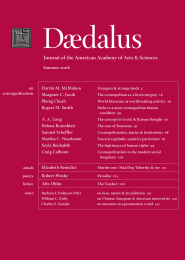The concept of the cosmopolitan in Greek & Roman thought
Cosmopolitan, the English equivalent of the older French word cosmopolite, derives from the ancient Greek term kosmopolites (kosmos plus polites) to signify “citizen of the world.” The original Cynic philosopher Diogenes of Sinope (c. 390–323 B.C.), notorious for his “in your face” discourse and readiness to do everything in public, probably coined this expression and first applied it to himself.1 “Citizen of the world” suited Diogenes’s stance of flouting local conventions in order to demonstrate their lack of grounding in what he took to be the pre-cultural norms of human nature. In light of the hundreds of individual Greek city-states, highly jealous of their autonomy but also Panhellenic in many of their customs and collective sense of superiority to the “barbarians,” citizenship of the world must have originally seemed a profoundly paradoxical, even nonsensical concept.
Diogenes was a younger contemporary of Plato (alleged to have called Diogenes “Socrates gone mad”) and much the same age as Aristotle.2 With its dropout lifestyle, Diogenes’s Cynicism never became a school with a formal curriculum. Its leading adherents left a prominent mark on Hellenistic literature through their sardonic criticism of conventional values, but Cynicism more or less died out as an independent movement and was absorbed into Stoicism until it underwent a revival in the Roman Imperial period.
. . .
Endnotes
- 1Diogenes’s use of the expression is attested in the biography of him composed by Diogenes Laertius (fl. c. A.D. 200) in his Lives of Eminent Philosophers, book 6, section 63. This biography (hereafter DL) is the best source for the life and thought of the Cynic Diogenes. On the Cynics in general, see Robert B. Branham and Marie-Odile Goulet-Cazé, The Cynics: The Cynic Movement in Antiquity and its Legacy (Berkeley and Los Angeles: University of California Press, 1996).
- 2DL, 6.54.
